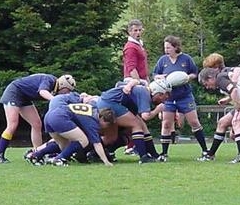|
 Sports Business Simulations is proud to host this area designed for the Berkeley All Blues, and their player, SBS Personality Sue Landsittel. The Berkeley All Blues are
very simply one of the most successful rugby organizations in the world. They're eight-time National Champions (1994, 1997, 1998, 2000, 2001, 2002, 2003, and 2004), and have been annually picked as the best women's rugby
club in America, if not the world. Sports Business Simulations is proud to host this area designed for the Berkeley All Blues, and their player, SBS Personality Sue Landsittel. The Berkeley All Blues are
very simply one of the most successful rugby organizations in the world. They're eight-time National Champions (1994, 1997, 1998, 2000, 2001, 2002, 2003, and 2004), and have been annually picked as the best women's rugby
club in America, if not the world.
Recently, while filling out some personal information on a garden-variety form, I had occasion to contemplate that age old question that women face everywhere from the DMV to the department store and the online dating world: should I lie about my weight?
Surely human mass belongs among the most dubious self-reported statistics - along with those related to sex and what your speedometer read before the cop pulled you over. After all, the temptations of a little white lie usually outweigh the consequences.
There's denial -- or maybe sweet oblivion -- to preserve. Not to mention the promise of self-fulfilling prophecy: if you don't bring that number in line with the truth, assuming you prefer a clear conscious, your only option is to bring the truth in line with the number. It's not so much a lie as a slightly premature statement of fact, you figure.
In my case, it was all that plus good old-fashioned female-to-female competition that ultimately led me to cave in and scribble down a number several pounds heavier than my actual weight.
See, I play on a women's rugby team, The Berkeley All Blues. And I was providing some information to be printed in the program for the national championships, where we would compete in a few weeks. And I'm kind of, well, lanky. Not by societal standards, mind you -- I'm a hair under 5'6 -- and pushing 155, and most "women's" magazines probably say I'm supposed to weigh 130 at the most. But rugby has its own standards -- the sport was born, after all, when a bored British bloke scooped up a soccer ball in his arms during a game and started running.
And by rugby standards, I'm small, especially for my role on the field as a forward, which chiefly involves participation in various inglorious shoving matches known as rucks, mauls, and scrums that leave my faster teammates free to get the ball and do much prettier and more glorious things, like score.

I figured if I didn't look all that intimidating in person, I could at least do so on paper, so I beefed myself up with the stroke of a pen.
I've been gently scolded by my teammates for my smallishness and encouraged to eat more at least as often as I was told that the opposite was true while I was growing up -- by the media, by my peers, even by my doctor. During high school, those messages drove me down to a weight of about 105 and a diagnosis of borderline anorexia. Now I feel like that damage has finally been undone. In no small way, rugby has saved a part of me. This is why I love it, and this is why rugby is such a wonderfully progressive sport for women, even though it has a reputation for being "old school -- on the men's side.
The women's rugby counterculture stubbornly defies the female ideal of today's fashion-magazine saturated society. There is no ideal rugby body. Or rather, there is not one -- there are many. There's a place on the field for small, quick backs who can run around people, and bigger, stronger forwards who can, well, run through people. A good team needs tall people, short people, fast people, strong people, little people, and yes, even bulky, or, god help us, "fat" people. What they usually have in common in my experience is that they're all passionate people.
My teammates and I have few qualms about ditching daintiness and delicacy and self-denial, on the field or anywhere else. Rugby players have a reputation for high consumption rates at the bar. But at least as rebellious is our behavior at the dinner table, particularly on the part of the forwards, who pride themselves in forging straight through buffet lines as well as defensive lines. We don't eat like girls. We eat like ruggers. We don't order smalls and we don't ask for dressing on the side and we always finish dessert.
We love dessert so much that we'll eat it more than once. One of my best memories from college, when too many women were probably eating side salads for dinner, was when my rugby team played in the National Championships at Penn State. On the night before the final, after a multi-course dinner banquet that featured carrot cakes and chocolate cakes for dessert, we decided to go to the famous campus creamery -- for dessert.
I don't know if my parents, who had come to watch us play, knew what they were getting into, but they offered to treat us. My dad probably reached deeper into his pocket than he had anticipated as the cashier ran up a long string of unabashed orders for real, unadulterated milkshakes and ice cream cones. And, in the face of such peer pressure, my mom didn't dare drop her customary hint at moderation by suggesting that I break stride and get frozen yogurt. I asked for the real thing. And watched the guy behind the counter pack ice cream in the silver milkshake canister until it was full, and then put in one more scoop.
I don't know how he managed to fit in any milk. But we won the next day, so something worked.
On the way home, while we were running through the airport trying to make a tight connection, a few of us decided we had to eat, right then, right there, regardless of flight departure time. So we stopped at a pizza-slice booth and hastily scraped together enough singles to buy an entire 16-inch pie. On the go again, we huddled around the box and negotiated oozing strands of cheese while dragging our luggage -- and the National Championship trophy -- behind us down a moving sidewalk. By the time we got to the gate, the airline agents were making the final boarding call, and the pizza was gone.
Now that I'm a bit older and wiser and play for a club team, the quality of food (and, I must say, alcohol) is vastly improved. Protein shakes have replaced milkshakes, and party fare typically features French bread and brie instead of Cheetos, and barbequed ribs and marinated chicken breasts instead of frozen hamburger patties (not to mention Petron tequila and microbrews instead of MGD). But in terms of quantity, the brazen, almost competitive spirit of calorie consumption is alive and well.
Why do we eat like we do? For one thing, it's because we work hard. Really hard. When we play, we're running, rucking, mauling, scrumming, tackling, getting knocked down, getting back up, and doing it all over again for 80 minutes. And we have to put it all out there, or else we'll be the shovees instead of the shovers. There is no room for polite restraint. In the words of my college coach, we must go full out.
In doing so, not only are we burning calories, we're breaking free of the usual constraints on female physicality. We learn that our bodies are amazingly strong and durable. We find that we can hit and hold our ground -- and get hit and get back up. We tap into this wonderful kind of sensuality that women don't often get to experience. And it's contagious. So we also find out that we deserve to take down dessert. In a pound-obsessed world where women are constantly told they must smile pretty and slim down in order to measure up, we'll savor the chance to pound a warm beer and a juicy burger at the traditional postgame drinkup after pounding each other into the mud on the field.
Rugby is over-the-top and overflowing -- with passion and violence and sweat and camaraderie and mud and beer. It's like being on this hedonistic trip. So we indulge. We discover that it's ok to be hungry. And most of all, we discover that it's even better to be full.
Comments
Some of these views are so out of date. Being told to gain weight as directed by a coach should have been accompanied with advice on ways in which to do so. Weight training in addition to regular training whilst eating the right kind of carbs, protein, fresh fruit and veg is the best way. Creatine and other supplements, as you have found out to your cost, is not the ideal fix. Being a prop forward is largely to do with technique and strength, not size and weight. Trust me I know.
Sue - The hedonistic, raunchy side of rugby that shoves fat-free and dainty out the window was one of the first things I loved about it. In college I was constantly telling people who didn't understand the sport how great it was to watch young women come out of their shell and reclaim dinner and mud. It seems ironic to me then, as someone who has always had a healthy body image, that that was ultimately a large part of why I stopped playing. Though it is much less common for women in our society, feeling pressure to gain weight can be damaging as well.
I still love rugby (and the all-blues) and love that more and more women are getting involved.
As a player who took creatine to gain weight to be a better prop- only to have it destroy my health and cause a huge weight gain shows the problems that women ruggers can face. At 5'2 I wasn't "big" enough to be a prop but I tried, and when told by a coach that I needed to bulk up to be a better player I listened -- And that was a big mistake. It is important for women athletes to know that there are women out there that have healthy body images and I wonder what more you -- or your team could do to spread your message? It is very important for girls of all ages to know that women athletes should be revered for their strength and dedication, and that strong women are beautiful. Have you looked into coaching any high school girls -- teams? There are lots of girls out there that could use your strength as a role model...
Because the "food consumption and weight issue" is placed in perspective, does that mean self-esteem is better? Does that translate into other aspects of life?
Sue- loved this line (one of many)
"We eat like ruggers. We don't order smalls and we don't ask for dressing on the side and we always finish dessert."
My first experience with club rugby players was feeling like I could eat as much as I wanted and not just belong, but gain a little respect. "Wow you eat like a forward; not the little back I thought you were."
The funny thing is that because there's so much calorie burning in this sport, calorie consumption becomes a glorious thing. It's one more thing for us to bond over -- FOOD!
Share your view with SBS. Click on "Comments" below:
|
Click to read the first page of Paris Hilton and Sports Marketing
|